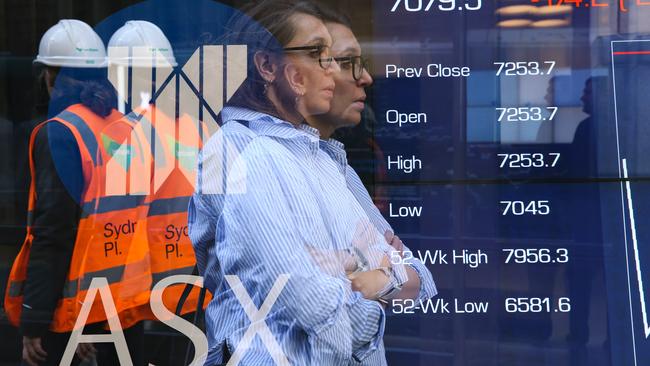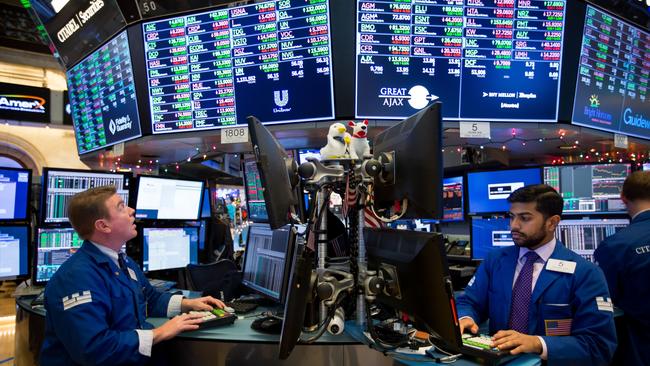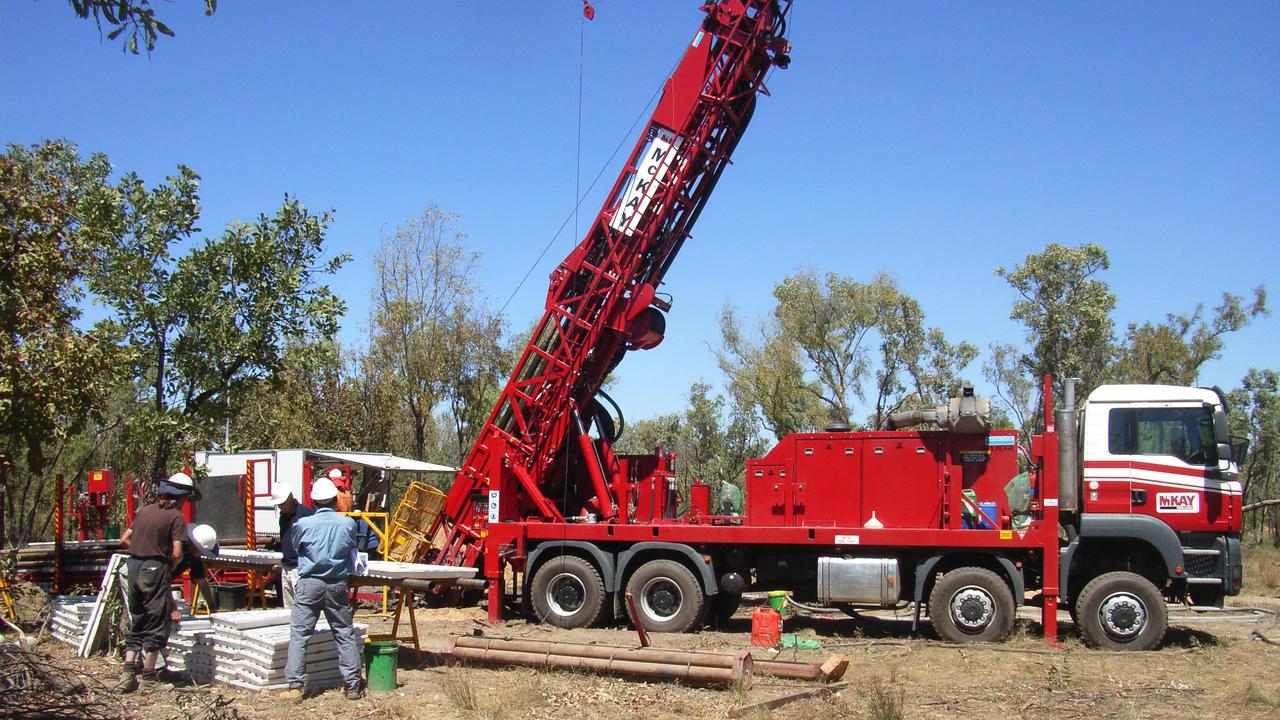Australian businesses ‘need policy support to take on US’: Wesfarmers CEO Rob Scott
Wesfarmers chief executive Rob Scott has warned Australia must lift its performance in the face of competitive pressure from the new pro-business Trump administration.

Business
Don't miss out on the headlines from Business. Followed categories will be added to My News.
Wesfarmers chief executive Rob Scott has warned Australia is “at a tipping point” must lift its performance in the face of competitive pressure from the new pro-business Trump administration.
And lagging business productivity risks further weakening Australia’s position as it vies for international capital, he says.
Mr Scott, whose company is one of the largest national employers (with companies including Bunnings, Target, Kmart and Priceline pharmacies), warned the federal government would need to take action to make sure that Australian firms were able to compete.
“We expect policies in the US to focus on improving the competitiveness of their domestic businesses,” he told The Australian’s 2025 CEO Survey.
“There may be lower taxes and reduced regulation – all designed to make US businesses more productive.
“Australia’s government needs to provide our businesses with similar support, ensuring we can secure our share of investment from global markets.”
CEO SURVEY 2025: FULL COVERAGE
Mr Scott’s comments come as the soaring US stockmarket in 2024 outstripped the performance of the ASX by more than three times, while the Australian dollar continues to fall against its US counterpart.
The S&P 500 Index rose by 23.3 per cent in 2024, following a gain of 24.2 per cent in 2023, while the S&P/ASX 200 index rose by only 7.5 per cent in 2024, after a 7.8 per cent return in 2023.
The Aussie dollar has fallen from US68.1c to a near five-year low of US61.81c this week. It last traded around US62c.
The soaring US market, led by gains by tech stocks, has led to speculation it is a tech bubble waiting to burst – or at least heading for a fall from its highs.
But others argue that the continued strength of the market is a reflection of global investor confidence in the US under a Trump administration, as well as the innovative capacity of US listed companies, particularly those with leading-edge technologies including those with an exposure to artificial intelligence.
US business productivity – measured by average output per worker – rose 2 per cent in the September quarter, from a year earlier. By comparison, Australia’s annual labour productivity growth is lagging at around 0.5 per cent, with the federal government’s Intergenerational Report anticipating a 20-year growth rate of 1.2 per cent.
In the US, the persistence of Wall Street’s rally has seen a revival of the arguments about “US exceptionalism”, arguing that the country has exceptional conditions for business – from entrepreneurialism and new technologies to a highly efficient capital market and mobile labour force that will become even more apparent under a Trump administration with president-elect Donald Trump promising more deregulation and lower taxes.

At the same time, the Chinese economy has slowed, with its entrepreneurs subject to political and regulatory constraints. The UK economy is adjusting to its role in a pro-Brexit world, European business is grappling with energy problems in the wake of the Russian invasion of the Ukraine, as well as social constraints on business, while capital is flowing out of emerging markets because of political and governance concerns.
Others argue that the increasing cash holdings of US billionaire Warren Buffett – who now has more than $US325bn ($523bn) in cash, nearly double the level of the previous year – is a sign that the veteran investor believes the US market is due for a fall.
But the continued strength of the US market as against the Australian market, with its narrower focus on the big banks and mining companies, comes at a time when business leaders surveyed by The Australian see the divergence in the business environment increasing in 2025 under Mr Trump.
Emerging Australian technology leaders such as Canva can now have a clear path to list in the US instead of on the ASX, to tap into a much larger capital market as those markets become more global.
But the relative policies of the governments on business regulation in Australia and the US are set to diverge after Mr Trump’s inauguration on January 20.
“We are now at a tipping point with productivity,” Mr Scott said in the CEO survey.
“If we don’t improve productivity now, we risk becoming the unlucky country later. Action to turn this around needs to be a collaborative Team Australia effort – government working hand-in-hand with business to improve outcomes for all Australians.”
He said Australian governments should continue slowing their spending to free up workers and resources, and reduce regulation and red tape, “particularly in relation to compliance costs and IR processes”.
Cochlear chief executive Dig Howitt, whose company has operations around the world including China, Australia, Europe and the US, said it was “still too early to know what a Trump presidency will mean for Australian business”.

But he said “there appears to be an intent to improve the competitiveness of the US economy by lowering taxes, reducing regulation and improving the efficiency of government services”.
“In Europe, regulation is increasing, which is stifling innovation and economic growth,” Mr Howitt said. “Australia has an opportunity to pursue an innovative approach to regulation which is aligned to our values while supporting prosperity and productivity.”
BHP chief executive Mike Henry, who announced plans to put the miner’s nickel mines in Western Australia on hold last year, said in the survey the outlook for the mining industry in the US was “positive”.
“There is a bipartisan recognition in the US of the need for greater focus on critical minerals, including for reforming project permitting processes, which would speed up the development of new mines in the US, improving the security of critical minerals supply chains,” Mr Henry said.
“The incoming administration is signalling continued strong support for improving the pace and certainty of regulatory approvals, and a focus on domestic investment over imports.”
Mr Henry said it was “essential” that Australia is able to compete on a global basis. “While much of this is business-led, it needs to be underpinned by sound government policy, which enables productivity,” he said.
Pressure for reform in Australia in 2025, led by the Business Council, has included calls for cuts in the corporate tax rate if Mr Trump goes ahead with his plans to cut the US rate to 15 per cent.
The corporate tax rate in Australia is 25 per cent for companies with a turnover of less than $50m and 30 per cent above that.
The CEOs’ comments come as analysts dissected the 2024 market for evidence of the strengths and weaknesses of the economy.
Australian Shareholders Association chief executive Rachel Waterhouse said the performance of ASX 200 companies in 2024 “highlights the rapid evolution of Australia’s corporate landscape”.
“Top performers demonstrate resilience and innovation, while the challenges faced by others emphasise the need for adaptability,” Ms Waterhouse said.

The top ASX performer of the year was digital financial services company Zip Co, which recorded a 363 per cent increase in its stock.
The top-performing sectors on the ASX were financials, IT and healthcare.
Zip’s increase followed a recapitalisation that addressed going-concern uncertainties, and an improvement in profits.
The second-strongest performance was that of Life360, which recorded a 198 per cent share price increase, on the back of a successful Nasdaq listing and strong financial results.
Sigma Healthcare stock rose by 162 per cent as a result of its planned merger with Chemist Warehouse and an associated equity raising. Its share price gain was followed by that of Pro Medicus, which gained 161 per cent with the global expansion of its flagship medical imaging product, Visage Imaging.
Technology companies that did well included Technology One, up 104 per cent, and Codan, up 88 per cent.
The worst performers were Liontown Resources, whose shares fell by 68 per cent on the back of falling lithium prices and the failed acquisition by Albemarle, and Star Entertainment, which fell 63 per cent amid regulatory scrutiny, declining revenues and reputational challenges.
This was followed by Coronado Global Resources, which fell 56 per cent, and audio visual equipment manufacturer Audinate, which fell 54 per cent, despite strong sales and profitability, as a shift toward software-based solutions affected margins.
Ms Waterhouse said the 2024 year on the local market was “shaped by global economic shifts, tighter monetary policies and evolving consumer behaviours” that “highlighted the resilience, adaptability and challenges faced by Australia’s corporate leaders”.
“For shareholders, maintaining a long-term perspective, staying invested during volatility and making disciplined decisions remain crucial,” she said.
More Coverage
Originally published as Australian businesses ‘need policy support to take on US’: Wesfarmers CEO Rob Scott





